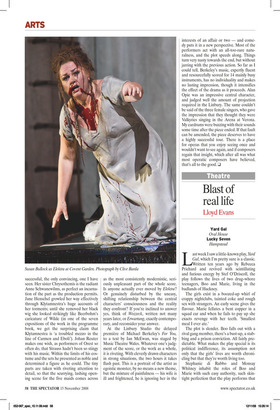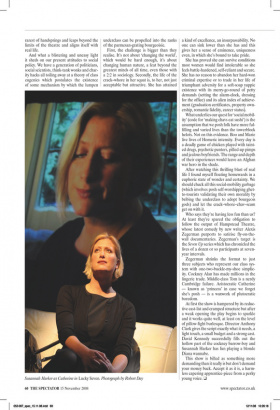Blast of real life
Lloyd Evans
Yard Gal Oval House Lucky Seven Hampstead
Last week I saw a little-known play, Yard Gal, which I’m pretty sure is a classic. Written ten years ago by Rebecca Prichard and revived with scintillating and furious energy by Stef O’Driscoll, the play follows the lives of two drug–whore teenagers, Boo and Marie, living in the badlands of Hackney.
The girls exist in a boozed-up whirl of crappy nightclubs, tainted coke and rough sex with strangers. An early scene gives the flavour. Marie fellates a bent copper in a squad car and when he fails to pay up she exacts revenge with her teeth. ‘Smallest meal I ever ate.’ The plot is slender. Boo falls out with a rival gang member, there’s a bust-up, a stabbing and a prison conviction. All fairly predictable. What makes the play special is its political indifference, its assumption not only that the girls’ lives are worth chronicling but that they’re worth living too.
Stephanie di Rubbo and Monsay Whitney inhabit the roles of Boo and Marie with such easy authority, such skintight perfection that the play performs that rarest of handsprings and leaps beyond the limits of the theatre and aligns itself with real life.
And what a blistering and uneasy light it sheds on our present attitudes to social policy. We have a generation of politicians, social scientists, think-tank wonks and charity hacks all toiling away at a theory of class eugenics which postulates the existence of some mechanism by which the lumpen underclass can be propelled into the ranks of the parmesan-grating bourgeoisie.
First, the challenge is bigger than they realise. It’s not about ‘changing the world’, which would be hard enough, it’s about changing human nature, a feat beyond the greatest minds of all time, even those with a 2:2 in sociology. Secondly, the life of the crack–whore in her squat is, to her, not just acceptable but attractive. She has attained a kind of excellence, an insurpassability. No one can sink lower than she has and this gives her a sense of eminence, uniqueness even, in which she’s bound to take pride.
She has proved she can survive conditions most women would find intolerable so she feels battle-hardened, self-reliant and secure. She has no reason to abandon her hard-won criminal expertise or to trade in her life of triumphant adversity for a soft-soap yuppie existence with its merry-go-round of petty demands (setting the alarm-clock, dressing for the office) and its alien index of achievement (graduation certificates, property ownership, romantic fidelity, career status).
What underlies our quest for ‘social mobility’ (code for ‘making chavs eat sushi’) is the assumption that we posh folk have more fulfilling and varied lives than the towerblock helots. Not on this evidence. Boo and Marie live lives of Homeric intensity. Every day is a deadly game of chicken played with tainted drugs, psychotic punters, pilled-up pimps and jealous boyfriends. The range and depth of their experiences would leave an Afghan war hero in the shade.
After watching this thrilling blast of real life I found myself floating homewards in a euphoric state of wonder and certainty. We should chuck all this social-mobility garbage (which involves posh self-worshipping ghetto-tourists validating their own morality by bribing the underclass to adopt bourgeois gods) and let the crack–whore–chav–scum get on with it.
Who says they’re having less fun than us? At least they’re spared the obligation to follow the output of Hampstead Theatre, whose latest comedy by new writer Alexis Zegerman purports to satirise fly-on-thewall documentaries. Zegerman’s target is the Seven Up series which has chronicled the lives of a dozen or so participants at sevenyear intervals.
Zegerman shrinks the format to just three subjects who represent our class system with one-two-buckle-my-shoe simplicity. Cockney Alan has made millions in the lingerie trade. Middle-class Tom is a nerdy Cambridge failure. Aristocratic Catherine — known as ‘princess’ in case we forget she’s posh — is a waxwork of plutocratic boredom.
At first the show is hampered by its reductive cast-list and cramped structure but after a weak opening the play begins to sparkle and it works quite well, at least on the level of pillow-fight burlesque. Director Anthony Clark gives the script exactly what it needs, a light touch, a small budget and a strong cast. David Kennedy successfully fills out the hollow part of the cockney barrow-boy and Susannah Harker has fun playing a blonde Diana wannabe.
This show is billed as something more demanding than it really is but don’t demand your money back. Accept it as it is, a harmless capering apprentice-piece from a perky young voice. ❑



















































































 Previous page
Previous page